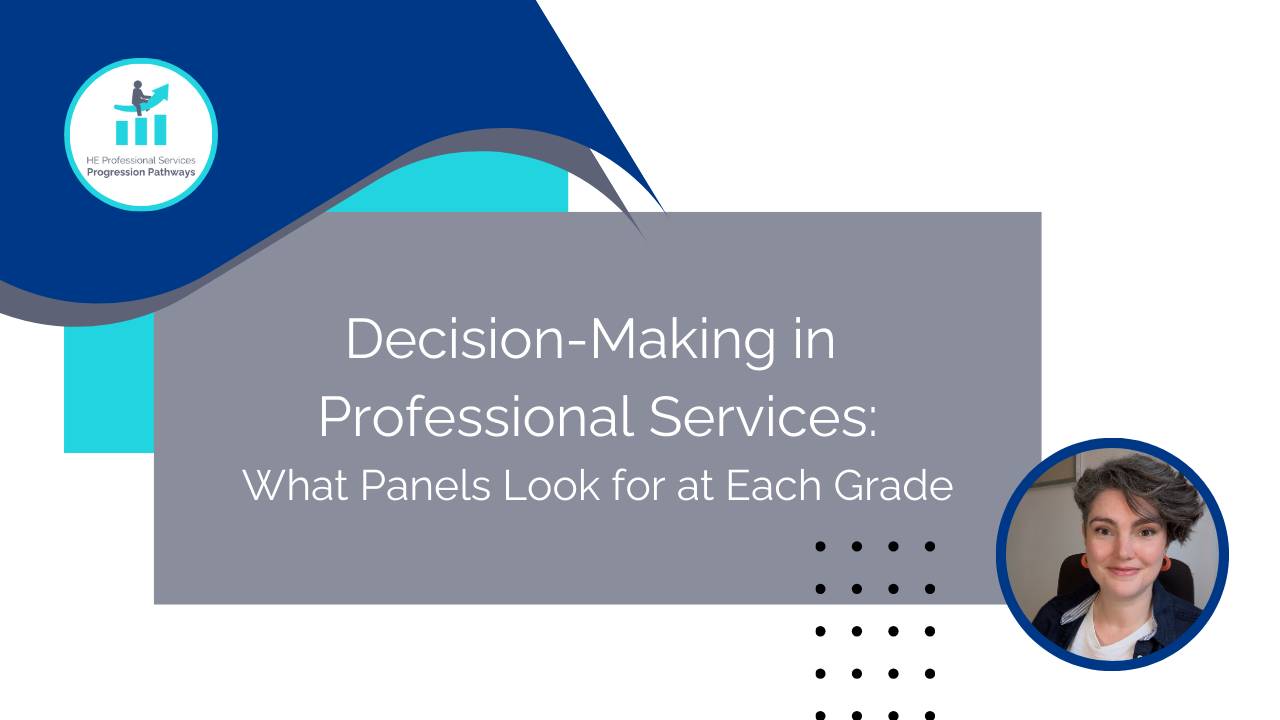Decision-Making in Professional Services: What Panels Look for at Each Grade
Sep 24, 2025
The interview question sounds innocent enough: "Tell us about a difficult decision you've had to make." But your answer reveals more about your readiness for progression than almost anything else you say.
Decision-making is where The Hidden Curriculum of Progression comes to life. It's not just about making good choices. It's about demonstrating the kind of judgement, risk assessment, and stakeholder consideration that the next grade demands.
Yet many capable professionals undersell their decision-making experience or choose examples that actually demonstrate they're not quite ready for the complexity ahead. Understanding what panels are really looking for can transform how you present your readiness.
Why Decision-Making Competency Matters
In HE Professional Services, your decision-making reveals your institutional maturity. Can you balance competing priorities? Do you understand risk? Can you make tough choices whilst maintaining relationships and institutional values?
These aren't abstract questions. At Grade 6, you're making decisions about processes and immediate service delivery. By Grade 8, you're making choices that can affect institutional delivery, resource allocation, and organisational culture. The stakes get higher, the information gets murkier, and the consequences last longer.
Panels need to see that you understand this progression and can demonstrate increasingly sophisticated decision-making at each level.
How Decision-Making Shifts as You Progress
From Grade 6 to Grade 7: Moving Beyond Procedures
Grade 6: You make confident decisions in your area of expertise, using judgement and data to weigh options. You handle uncertainty by asking the right questions and applying practical reasoning.
Grade 7: You navigate complexity and make timely decisions when no clear precedent exists. You evaluate risk, consult where needed, and explain your rationale.
The key shift: Moving from rule-based to principle-based decision-making. Grade 7s can't just follow procedures. They need to interpret situations, consider multiple factors, and make judgement calls when the answer isn't obvious.
From Grade 7 to Grade 8: Institutional Decision-Making
Grade 7: You navigate complexity and make timely decisions when no clear precedent exists. You evaluate risk, consult where needed, and explain your rationale.
Grade 8: You make complex decisions with institutional impact. You consider political, operational, and human factors in your judgement and remain accountable for outcomes.
The key shift: Understanding institutional implications. Grade 8 decisions affect more than your immediate area. They set precedents, influence culture, and impact the university's reputation. You need to think like an institutional leader, not just a departmental manager.
From Grade 8 to Grade 9: High-Stakes Leadership
Grade 8: You make complex decisions with institutional impact. You consider political, operational, and human factors in your judgement and remain accountable for outcomes.
Grade 9: You handle high-risk decisions and lead through crisis or complexity. You are known for sound judgement, ethical courage, and the ability to stay strategic under pressure.
The key shift: Becoming someone others turn to in crisis. Grade 9 decision-making often happens under pressure, with incomplete information, and with significant consequences. You need to demonstrate calm authority and the ability to make difficult choices that others can't or won't make.
Common Decision-Making Challenges
The Information Trap
Many professionals wait for complete information before making decisions. But senior roles require making good choices with incomplete data, balancing the risk of delay against the risk of being wrong.
The Consensus Illusion
Whilst consultation is important, senior decision-makers need to be comfortable making unpopular choices when necessary. Too much consensus-seeking can signal lack of leadership readiness.
The Scope Misunderstanding
Choosing examples that demonstrate local impact when the role requires institutional thinking. Panels want to see decisions that show you understand the broader context and consequences.
The Attribution Error
Taking credit for good outcomes whilst blaming poor decisions on circumstances or others. Senior roles require owning decisions fully, including when things don't go to plan.
How to Prepare Yourself
1. Document Your Decision-Making Process
Start keeping a record of significant decisions you make: What factors did you consider? Who did you consult? What was the outcome? What would you do differently? This reflection builds your decision-making awareness and gives you examples for applications.
2. Seek Decisions with Broader Impact
Volunteer for projects or committees where your decisions will affect multiple stakeholders or have longer-term consequences. This experience is essential for demonstrating readiness for senior roles.
3. Practice Thinking Institutionally
Before making decisions in your current role, ask yourself: How does this choice align with university strategy? What precedent am I setting? Who else is affected by this decision? This broader perspective is crucial for progression.
4. Learn from Senior Leaders
Pay attention to how Grade 8 and 9 colleagues approach decisions. What questions do they ask? How do they frame choices? How do they communicate decisions to different audiences? This observation helps you understand the sophistication expected at senior levels.
The Uncomfortable Truth
Senior roles require making decisions that others can't or won't make. This includes difficult conversations, resource allocation, strategic trade-offs, and sometimes choosing between competing values. If you're not comfortable with this responsibility, senior progression may not be right for you.
But if you find yourself naturally thinking about broader implications, considering multiple stakeholder needs, and feeling energised by complex challenges, then decision-making capability could be one of your strongest progression assets.
The key is recognising these qualities in yourself and learning to articulate them in ways that demonstrate your readiness for increased responsibility.
If you’re aiming for promotion, decision-making credibility matters more than ever.
That’s exactly what we work on inside Getting Ready for Your Next Grade. These are 6-12-month, small-group programmes where you’ll build clarity, competence, and credibility at the next grade.
Or take the quiz to see how ready you are already:
Quiz for Ready for Senior Management?
Quiz for Ready for Senior Leadership?
Understanding decision-making is just one element of progression readiness. Read The Hidden Curriculum of Progression: Unspoken Rules for Career Growth in HE Professional Services for the complete picture.
Next up: Influence Without Authority: Hidden Skills for Progression in HE
